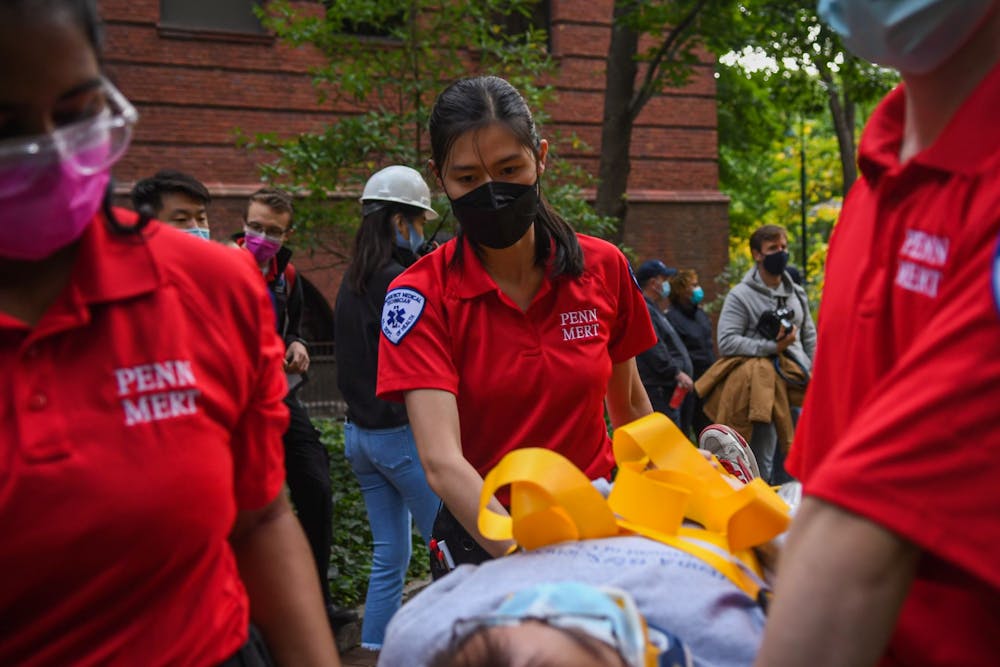Walkie talkies crackled to life as members of Penn’s Medical Emergency Response Team witnessed a staged chemical explosion and spill in the Chemistry Laboratories and were met with screams as they entered the building. Student volunteers lay on the ground during the organization's biannual Mass Casualty Incident drill, writhing in pain, while adults limped around the lab.
“We’re all gonna die! We gotta get out of here!” said one student repeatedly.
In MERT’s first in-person drill since fall 2019, senior MERT members, student members of Drexel’s Emergency Medical Services, and students from Penn and other local colleges volunteered to serve as patients, each with an assigned injury or medical condition and a card with their vitals. The drill – performed in conjunction with Philadelphia’s Police Department and Penn’s Division of Public Safety – is an opportunity for MERT to work with outside organizations and prepare for medical emergencies that could occur on campus.
Patient volunteers arrived an hour before the drill began and were given specific cards with information about injuries and vitals by students on MERT. Some patients were instructed to behave uncooperatively or lose consciousness to simulate a realistic emergency situation, and a professional makeup artist applied life-like bruises and cuts on the volunteers.
Thirty-eight members of MERT were notified in advance to meet for the mass casualty incident drill but were not given the exact location or told that the drill would be an explosion and spill until they received the dispatch when they arrived at the scene behind Fisher Fine Arts Library, MERT Chief and College senior Emily Kopp said.
After learning that the drill was a chemical reaction and spill, the MERT members assessed the safety of the scene in cooperation with other agencies before entering the building. MERT members then began evacuating patients and separating them into four separate triage units depending on the urgency of their injuries.
Disaster Response Team Officer and College senior Lilian Zhang planned the event and polled MERT members to determine which emergency the drill would address. Past drill emergencies included a school shooting and a bus crash, while Sunday’s drill addressed hazardous materials – which MERT has not practiced responding to recently.
MERT is well known on campus for responding to alcohol-related calls, Zhang, who is a former DP copy staffer, said. She added, however, that members of MERT are trained to respond to a wide variety of emergencies on campus.
RELATED:
UA wants to replace emergency phone boxes on campus with a button to speed up responses
Penn faculty call for bolder University climate action and fossil fuel divestment
MERT responds to any medical emergency between 30th and 43rd streets and Market and Baltimore Streets with confidential care, Zhang said.
The student-run organization has 67 active members who are licensed emergency medical technicians under the Pennsylvania Department of Health, Zhang said. They often provide pre-hospital treatment to students and other community members, working with Penn Police and the Philadelphia Fire Department, according to MERT’s website.
“One of my main objectives since I've been in MERT is to destigmatize it and give it a different image,” Zhang said. “We are all state licensed EMTs, and we're all certified to deal with situations like mass casualty incidents, which involve a lot of training and a lot of preparation.”
COVID-19 precautions have prevented an in-person drill for the past three semesters. In spring 2021, MERT held a virtual mass casualty incident drill on GatherTown, a video conferencing platform that resembles real life by allowing users to walk around a virtual landscape. The drill did not offer members the same experience as an in-person Mass Casualty Incident drill, Zhang said.
Kopp said that the emergency drills “feel very real,” and prepare the team for dealing with actual incidents that could occur on campus.
“This was something that could happen unfortunately,” Kopp said. “We have chemicals on campus that could turn into a hazmat situation so we want to be prepared for it.”









